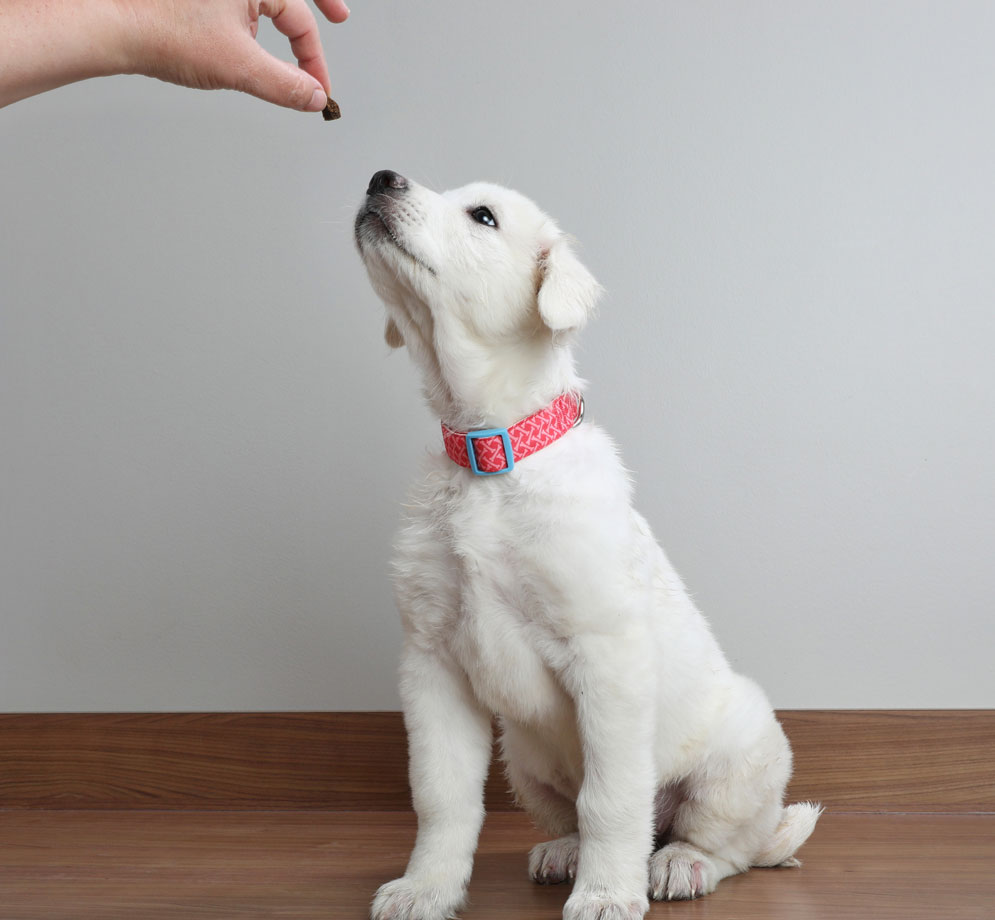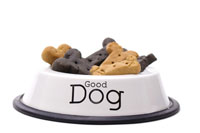Healthy Treats for Dogs

Many of us are concerned about finding healthy snack alternatives for ourselves and our children. It's important to consider the quality of the treats we give our dogs, as well.
Conventional Dog Treats
We love our dogs, and it’s easy to spoil them. Treats help strengthen the special relationship we have with our dogs, and they are helpful as training tools. Many conventional dog treats—biscuits, cookies, or chews—are loaded with fat, sugar, and calories. Not to mention dyes, preservatives, and artificial flavors. Just as with our own foods: if it looks like junk, it probably is. Are these treats harmful for the average dog? Not necessarily. Most humans can devour a bowl of Doritos or a double fudge brownie now and then with no ill effects. But indulge too much or too often, and problems result.
Too much junk food can upset a dog's stomach, as well as disrupt the normal balance of vitamins and nutrients in the diet. And it can also make your dog fat. Most vets recommend that treats comprise no more than 10% of a dog’s caloric intake. An average 40-pound adult dog needs just under 1000 calories total per day. A small dog needs much less. At 35 calories, a single Pupperoni treat might comprise one-tenth of a toy poodle’s total daily calorie allowance. And who ever stops at just one?
Conventional treats, even in moderation, can be a problem for a dog with food allergies, or one with certain medical disorders such as diabetes, pancreatitis, liver or kidney problems, or bladder stones.
Healthier Dog Treat Alternative: There are countless dog treats on the market that are labelled "low fat" or "natural." Not only are they less fattening, but many offer healthy ingredients and lack the added sugar, dyes, or chemicals. Always read the ingredients list on the package. If you wouldn’t eat it, neither should your dog.
Treats for Dog Training
If you’re using treats to train your dog, here are some tips for keeping the calories under control:
- Try soft, low-calorie dog treats.
- Freeze-dried chicken or liver treats work well, because they are tasty, low in fat, and can be broken into small bits.
- A low fat cereal such as Cheerios can work well.
- Consider using your dog’s own kibble as a treat. Be sure to subtract the training treats from his daily food ration.
- Consider using clicker training, a method that decreases the need for using treats as rewards.
If your dog has food allergies or special medical needs, it’s best to consult your veterinarian about healthful treat options.
Table Treats for Dogs
Some Human Foods That Are Unsafe for Dogs:
- Chocolate
- Onions
- Garlic
- Grapes
- Raisins
- Xylitol (artificial sweetener)
- Macadamia nuts
- Nutmeg
- Cooked meat bones
- Poultry bones
It’s tempting to share table scraps with your dog, but there are a few reasons why this isn’t a good practice. First and foremost, it teaches your dog to beg at the table. Secondly, it’s another great way for her to pack on the pounds. Finally, there are many human foods that simply aren’t safe for dogs (see box). Overindulging in fatty or greasy foods can cause a serious gastrointestinal disorder in dogs called pancreatitis, so this should be avoided. And leftover bones are never a good idea because the cooking process renders bones more brittle and, therefore, more likely to break into hazardous chunks and splinters.
Healthier Alternative: If you choose to share your feast with Fido, select only cooked lean meats or vegetables. And again, do so in moderation. Your veterinarian may have specific recommendations for your dog. Here is a general list of healthy people foods for dogs:
- Green beans
- Carrots

- Apples (seeds removed)
- Bananas
- Watermelon
- Strawberries
- Canned pumpkin (plain)
- Eggs (cooked)
- Popcorn (plain)
- Rice (cooked)
- Peanut butter (just double check the label to ensure it does NOT contain xylitol)
Bones, Rawhides, and Pigs' Ears.
Our cultural associations of a dog chewing a bone run deep. However, bones, rawhides, pigs' ears, cows' hooves, and similar chew treats can pose serious risks for dogs and are best avoided. This is especially true for puppies or adult dogs who are fanatical chewers. A dog can easily break a tooth on a rock-hard bone. A chunk of bone or rawhide can get lodged on the way down, causing a choking hazard or gastrointestinal obstruction. The fat, dyes, and preservatives in rawhides can irritate the intestinal tract, and bone chips and splinters most certainly can as well.
Healthier Alternative: Dogs chew for exercise, entertainment, and comfort. To satisfy your dog’s chewing urge without the risks, try either indestructible synthetic bones or better: a Buster Food Cube or Kong toy stuffed with a treat such as peanut butter or kibble. A dog will spend hours happily—and safely—gnawing at this type of toy.
Dental Treats for Dogs
It’s widely believed that chewing bones and rawhides can improve dental health in dogs. There is an abundance of dental treats on the market, but they are not all created equal. Only a handful are clinically proven to help with canine dental disease, and many are quite fattening. One popular brand’s extra-large dental chew weighs in at just under 400 calories. This is one-third of the recommended daily calorie intake for a 50 pound dog!
Healthier Alternative: A handful of products are clinically proven to promote dental health. CET chews are a popular example. CET chews are specially treated rawhide strips. They have an abrasive texture and contain a natural antiseptic that tends to cleanse the teeth as the dog chews.
Disclaimer: This website is not intended to replace professional consultation, diagnosis, or treatment by a licensed veterinarian. If you require any veterinary related advice, contact your veterinarian promptly. Information at DogHealth.com is exclusively of a general reference nature. Do not disregard veterinary advice or delay treatment as a result of accessing information at this site. Just Answer is an external service not affiliated with DogHealth.com.
Notice: Ask-a-Vet is an affiliated service for those who wish to speak with a veterinary professional about their pet's specific condition. Initially, a bot will ask questions to determine the general nature of your concern. Then, you will be transferred to a human. There is a charge for the service if you choose to connect to a veterinarian. Ask-a-Vet is not manned by the staff or owners of DogHealth.com, and the advice given should not delay or replace a visit to your veterinarian.

